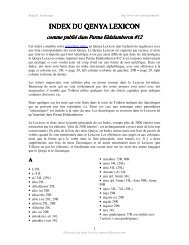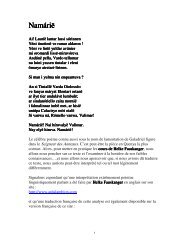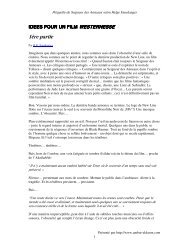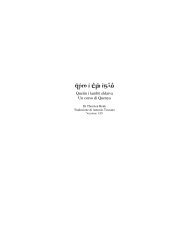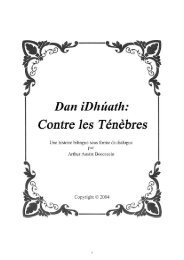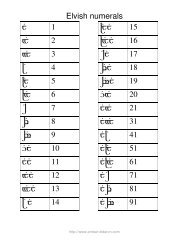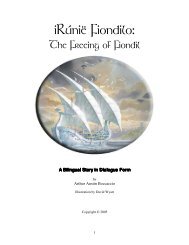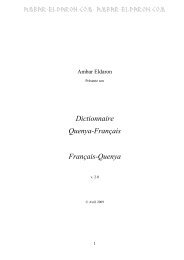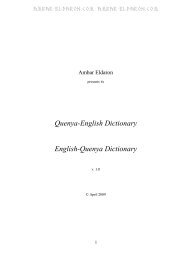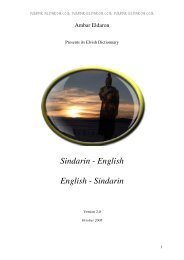Quenya Reverse Wordlist - Ambar Eldaron
Quenya Reverse Wordlist - Ambar Eldaron
Quenya Reverse Wordlist - Ambar Eldaron
You also want an ePaper? Increase the reach of your titles
YUMPU automatically turns print PDFs into web optimized ePapers that Google loves.
Helge K. Fauskanger http://www.uib.no/People/hnohf/<br />
q.v.<br />
opmut tumpo "hump" (TUMPU)<br />
or -ro pronominal ending "he", in antaváro,<br />
orabmat tambaro "woodpecker" (TAM)<br />
orac [caro] ("k") "doer, actor, agent" (KAR;<br />
replaced by tyaro)<br />
oracatho [ohtacaro] ("k") "warrior" (KAR)<br />
oradnan nandaro ("ñ") "harper"<br />
(ÑGAN/ÑGÁNAD)<br />
oraiaV Vaiaro a name of Ulmo, lord of<br />
Vaiya (WAY)<br />
oránaciA Aicanáro ("k") "Sharp Flame, Fell<br />
Fire", masc. name; Sindarized as Aegnor. (So in<br />
SA:nár and PM:345; MR:323 has Aicanár.)<br />
oránaeF Fëanáro "Spirit of Fire", Fëanor<br />
(SA:nár, PHAY). The word apparently includes the<br />
masculine ending -o.<br />
oránayaF Fayanáro archaic form of<br />
Fëanáro (PM:343)<br />
oranmec cemnaro ("k") "potter". (TAN)<br />
oratneuq quentaro ("q") "narrator" (KWET)<br />
oratno ontaro "begetter, parent" (evidently<br />
masc.); pl. ontari (see ontani) covers both sexes.<br />
(ONO)<br />
oravat tavaro, tavaron "dryad, spirit of<br />
woods" (evidently masc.) (TÁWAR)<br />
orayn *nyaro - see nyano<br />
orayt tyaro "doer, actor, agent" (KAR)<br />
oriam mairo "horse" (GL:56; later sources<br />
have rocco)<br />
oro oro "hill" (LT1:256; rather ambo in<br />
mature <strong>Quenya</strong>)<br />
oro oro- "rise" (LT1:256; mature <strong>Quenya</strong><br />
has orta-)<br />
orôkelebm *mbelekôro is mentioned as "the<br />
oldest Q form" of Melkor; this is obviously a form<br />
that belongs to Common Eldarin rather than <strong>Quenya</strong><br />
as we know it; note that it is asterisked as unattested<br />
(WJ:402)<br />
oróno onóro "brother" (of blood-kinship)<br />
(TOR, NÔ (WÔ) )<br />
oronron nornoro- "run on, run smoothly"<br />
(LT1:263)<br />
orouq quoro- ("q") "choke, suffocate"<br />
(LT1:264)<br />
orov voro, voro- "ever, continually" (BOR,<br />
Narqelion)<br />
oruan nauro ("ñ") "werewolf" (ÑGAW)<br />
oruaS Sauro, Sauron (Þ) "the Abhorred",<br />
name of a Maia. Earlier Thauron (SA:thaur, THUS),<br />
archaic *thaurond- (Letters:380, where a special<br />
letter is used instead of the digraph th)<br />
oruen neuro "follower, successor" (NDEW)<br />
orúh húro "storm" (MC:214; this is<br />
"Qenya")<br />
orún núro "sunset" (NDÛ)<br />
55<br />
orúS Súro (Þ) alternative form of Sauro(n)<br />
(THUS)<br />
osto otso "seven" (SA:sîr,<br />
OT/OTOS/OTOK)<br />
ót tó "wool" (TOW)<br />
ot -to ending for dual genitive (Plotz)<br />
otar rato "soon" (Arct)<br />
otára aráto "champion, eminent man"<br />
(SA:ar(a) )<br />
otáradniF Findaráto *"Hair-champion",<br />
Sindarized as Finrod (SA:ar(a) )<br />
otáragnA Angaráto "Iron-champion", masc.<br />
name, Sindarin Angrod (SA:ar(a) ).<br />
othus suhto "draught" (SUK)<br />
otial laito, also laisi, "youth, vigour, new<br />
life" (LT1:267)<br />
otl -lto "they", pronominal suffix occurring<br />
in Fíriel's Song (meldielto "they are beloved" and<br />
cárielto "they made"), also in LT1:114: tulielto "they<br />
have come". Probably not valid in mature <strong>Quenya</strong><br />
(replaced by -ntë?)<br />
otl -lto ending for dual ablative (Plotz)<br />
otlav valto "luck" (LT1:272)<br />
otlot tolto "eight" (TOL 1 -OTH/OT)<br />
otlu ulto- "pour" (intransitive?) (LT1:270; in<br />
mature <strong>Quenya</strong> ulya- pa.t. ullë)<br />
otna anto (1) "mouth", also name of tengwa<br />
13 (Appendix E)<br />
otna anto (2) "giver" (m.) (ANA 1 )<br />
otne ento "next" (Arct)<br />
otnoro oronto, orontë "Sunrise" (LT1:264)<br />
otrabmA <strong>Ambar</strong>to *"upwards-exalted",<br />
mother-name (never used in narrative) of Pityafinwë<br />
= Amrod (PM:353, 354)<br />
otrabmU Umbarto "Fated", mother-name<br />
(never used in narrative) of Telufinwë = Amras. The<br />
ominous name was altered to <strong>Ambar</strong>to by Fëanor.<br />
(PM:353-354)<br />
otram marto "fortune, fate, lot" (LT2:348)<br />
otrama amarto "Fate" (also ambar)<br />
(LT2:348; in mature <strong>Quenya</strong> rather umbar, umbart-)<br />
otro orto "mountain-top" (ÓROT)<br />
otro orto- "raise" (LT1:256; in mature<br />
<strong>Quenya</strong> orta-)<br />
otsa asto "dust" (ÁS-AT)<br />
otsam masto "village" (LT1:251)<br />
otso osto (1) "a strong or fortified building<br />
or place, strong place, fortress" (MR:350, 471;<br />
WJ:414); "city, town with wall round" (OS).<br />
otso osto (2) "the gates of the Sun"<br />
(LT1:264; this "Qenya" word is probably obsoleted<br />
by # 1 above)<br />
otsorúT Túrosto "Gabilgathol", a dwelling<br />
of the Dwarves (Sindarin Belegost; the names mean<br />
"Mickleburg", "Great Fortress")<br />
Presented by http://www.ambar-eldaron.com



